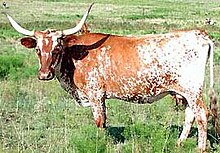User:Johntex/Joseph McCoy

Joseph McCoy was a 19th century cattle baron. He is often cited as the inspiration for the phrase "the real McCoy" because of his reputation and reliability and because he referred to himself by that phrase. He made good on his pledge to Texas ranchers that if they would drive their Longhorn cattle from Texas to Kansas that he would have them shipped by rail to other markets and that the ranchers would receive a good price for their stock.[1],[2]
In the 1860's, cattle ranchers in Texas were facing difficulties getting their Longhorn cattle to market. Kansas homesteaders objected to the cattle crossing their land because the cattle could carry tick which spread a disease called Texas Fever (or Spanish Fever) which could be fatal to some types of cattle. The disease could make a Longhorn sick, but they were hardier stock than the northern cattle and Longhorns seldom died from the disease.[3] McCoy himself said of the disease:
In 1868 a great number of cattle arrived in Kansas and the mid-west from Texas; appx. 40,000. With them came a tick born disease called “Spanish Fever”. The local shorthorn breeds were seriously affected and in some towns the loss of the cattle was almost 100%. The result was a great prejudice against Texas cattle in Eastern Kansas and Missouri[4]
McCoy expected that the railroads companies were interested in expanding their freight operations and he saw this as a good budiness opportunity. McCoy built a hotel, stockyard, office and bank in a little village along the Union Pacific. This village became known as Abilene, Kansas - one of the first cow towns. McCoy's plan was for cattle to be driven to Abilene from Texas and taken from there by rail to bigger cities in The Midwest and The East.
Abilene sat near the end of a trail established by Jesse Chisholm during the American Civil War for supplying the Confederate army. This trail ran to the west of the settled portion of Kansas, making it possible to use the trail without creating hostility from the Kansas homesteaders.
McCoy advertised extensively throughout Texas to encourage cattle owners to drive their cattle to market in Abilene. By 1870 thousands of Texas longhorn cattle were being driven over the Chisholm Trail to the shipping center at Abilene. By 1871 as many as 5,000 cowboys were being paid off during a single day, and Abilene became known as a rough town in the Old West.[5] Due to their long legs and hard hoofs, Longhorns were ideal trail cattle; even gaining weight on their way to market.[6] One story says that McCoy bragged before leaving Chicago that he would bring 200,000 head in 10 years and actually brought two million head in 4 years, leading to the phrase "It's the Real McCoy"[7]
McCoy was also the author of Historic Sketches of the Cattle Trade of the West and Southwest, which was published in 1974, more than 50 years after his death. Joseph McCoy died in Kansas City, Missouri on October 19, 1915.[8]
References
[edit]- ^ American West - The Cattle Industry.
- ^ Stuebbe, Kevin Quinn The Real McCoys The New York Times August 25, 2002 - Accessed February 28, 2006.
- ^ Famous Cattle Trails - Accessed February 28, 2006.
- ^ Shackelford, Bruce M. Texas Longhorns - Where They Came From and Where They Went- Accessed February 28, 2006.
- ^ Jesse Chisholm and Joseph McCoy - Accessed February 28, 2006.
- ^ Spartacus School Net p1 - Accessed February 28, 2006.
- ^ William, R. L. Iowa State Animal Science Archives - Accessed July 8, 2005.
- ^ Spartacus School Net p2 - Accessed February 28, 2006.
